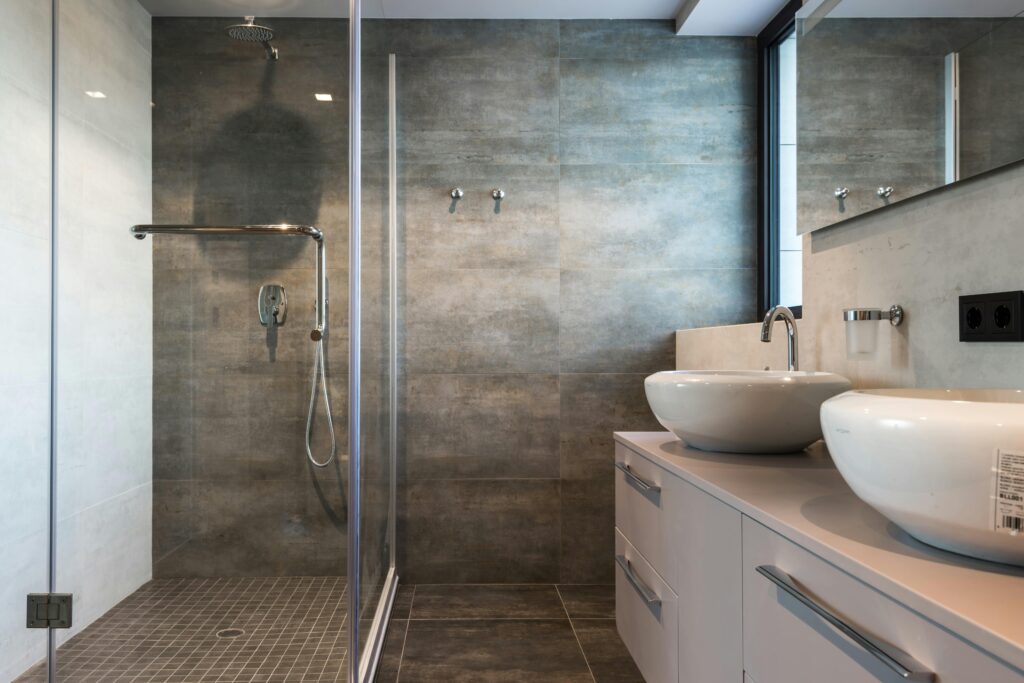Renovating your bathroom can enhance both the functionality and value of your home. Whether you’re planning a full refurbishment or a simple upgrade, understanding the costs involved is essential. In this 2025 guide, we will explore the costs of bathroom renovations in the UK, the factors that influence pricing, and ways to save money while achieving a stylish and practical space.
Average Cost of a Bathroom Renovation in the UK
The cost of a bathroom renovation depends on the size of the bathroom, the quality of fixtures, and the complexity of the work. Here’s a rough estimate of typical costs:
- Basic bathroom renovation: £3,000 – £7,000
- Mid-range bathroom renovation: £7,000 – £15,000
- High-end/luxury bathroom renovation: £15,000 – £30,000+
Cost Breakdown by Square Metre
On average, bathroom renovations cost between £1,000 and £3,000 per m², depending on materials and labour.
Factors Affecting Bathroom Renovation Costs
Several key factors influence the cost of a bathroom renovation:
1. Size of the Bathroom
Larger bathrooms require more materials and labour, increasing costs.
2. Extent of Renovation
- Cosmetic updates (painting, new fixtures, minor repairs) are cheaper.
- Full renovations (new tiling, plumbing, and electrical work) cost more.
- Structural changes (moving walls or adjusting layouts) add significant expenses.
3. Quality of Materials and Fixtures
- Basic fixtures: £1,000 – £3,000
- Mid-range fixtures: £3,000 – £8,000
- Luxury fixtures: £8,000 – £20,000
4. Labour Costs
- Plumbers: £40 – £80 per hour
- Electricians: £50 – £100 per hour
- Tilers: £30 – £60 per hour
- Carpenters: £35 – £70 per hour
- General builders: £150 – £250 per day
5. Plumbing and Electrical Work
- Moving a sink or toilet: £500 – £1,500
- Installing a new shower: £500 – £3,000
- Underfloor heating: £1,000 – £3,500
6. Tiling and Flooring
- Ceramic tiles: £20 – £50 per m²
- Porcelain tiles: £30 – £70 per m²
- Luxury tiles (marble, stone): £50 – £150 per m²
- Vinyl flooring: £15 – £50 per m²
- Underfloor heating: £50 – £150 per m²
7. Bath and Shower Costs
- Standard bathtub: £200 – £1,000
- Freestanding bathtub: £700 – £3,000
- Walk-in shower: £500 – £3,000
- Wet room installation: £5,000 – £10,000
8. Toilets, Sinks, and Storage
- Basic toilet: £100 – £500
- High-end toilet: £500 – £2,000
- Basic sink: £100 – £600
- Vanity unit with storage: £300 – £2,500
9. Lighting and Ventilation
- LED spotlights: £100 – £500
- Feature lighting: £200 – £1,500
- Extractor fan installation: £150 – £500
10. Painting and Decorating
- Painting walls and ceiling: £200 – £800
- Wallpaper feature wall: £100 – £500
- Decorative finishes: £200 – £1,000
Additional Costs to Consider
- Waste removal and disposal: £200 – £1,000
- Building regulation approval (if needed): £300 – £1,000
- Waterproofing and damp-proofing: £500 – £2,000
- Smart home features (digital shower, heated mirror, etc.): £500 – £3,000
How to Save Money on a Bathroom Renovation
- Plan your budget in advance – Avoid unnecessary expenses.
- Choose cost-effective materials – High-quality alternatives to luxury materials can save thousands.
- Keep the layout unchanged – Moving plumbing and electrical points increases costs significantly.
- Do some work yourself – Tasks like painting and decorating can reduce labour costs.
- Shop around for fixtures and fittings – Compare prices from different suppliers.
- Consider prefabricated solutions – Pre-made vanity units and shower enclosures can lower costs.
- Hire experienced professionals – A well-done job prevents costly repairs in the future.
Step-by-Step Process of a Bathroom Renovation
1. Planning and Design
- Measure your bathroom space.
- Choose a design and layout.
- Select fixtures, fittings, and materials.
- Set a realistic budget.
2. Preparation and Demolition
- Remove old tiles, fixtures, and flooring.
- Check for plumbing or electrical issues.
3. Plumbing and Electrical Work
- Install new pipework, wiring, and ventilation.
- Fit underfloor heating if required.
4. Walls, Flooring, and Tiling
- Install waterproofing and plasterboard.
- Lay tiles and flooring.
- Paint and decorate as needed.
5. Installing Fixtures and Fittings
- Fit the bath, shower, sink, and toilet.
- Install cabinets, mirrors, and storage units.
6. Final Touches and Inspection
- Seal all joints and edges.
- Check plumbing and electrical connections.
- Ensure the bathroom meets building regulations.
Is a Bathroom Renovation Worth It?
A bathroom renovation can add 4-5% to your home’s value, making it a worthwhile investment. It also enhances daily comfort and usability.
Pros:
- Increases home value.
- Improves energy efficiency.
- Enhances aesthetics and functionality.
- Reduces future maintenance costs.
Cons:
- Can be expensive.
- Requires time and planning.
- Disruptive during construction.
Common Pitfalls to Avoid
- Underestimating costs – Always have a contingency budget of 10-20%.
- Choosing poor-quality materials – Cheap materials may not last long.
- Ignoring ventilation – Poor ventilation can lead to damp and mould.
- Not planning storage – A cluttered bathroom reduces functionality.
- Skipping waterproofing – Proper sealing is essential to prevent leaks.
Final Thoughts
Bathroom renovations are a great way to add value and comfort to your home. By carefully planning your budget, selecting the right materials, and hiring professionals, you can create a stylish and functional space without overspending.
Looking for expert bathroom renovation services? Contact Deedan Group today for professional advice and competitive pricing!


